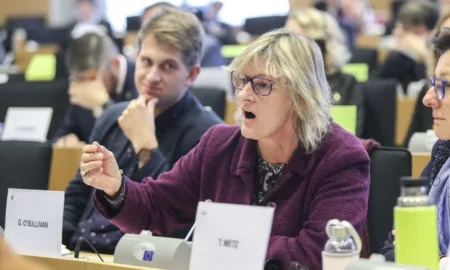14 March 2023
By Mary Bermingham
mary@TheCork.ie
Retrofits in Cork already kicking off with training from the local Education and Training Board. MEP for Ireland South Grace O’Sullivan welcomed the vote this week on the Energy Performance of Buildings Directive, which was led by European Parliament chief negotiator and Green Party colleague, Ciarán Cuffe.
The European Parliament today (14 March 2023) voted for an ambitious proposal to drastically increase the number of energy-efficient homes and businesses. The Energy Performance of Buildings Directive under negotiation in Brussels will set a ‘Minimum Energy Performance Standard’ which will require buildings that aren’t up to scratch to be renovated and gradually improved, with a mix of EU, public and private funding. All EU countries will be required to upgrade the worst performing buildings by up to three energy performance classes by 2033, such as by installing heat pumps, double glazing or even by sourcing electricity from renewable energy. The negotiations are being led by Dublin Green MEP Ciarán Cuffe for the European Parliament. Historic buildings will be protected from a number of renovation measures, while social safeguards will protect renters from arbitrary rent increases.
Speaking from the European Parliament, MEP for Ireland South Grace O’Sullivan said: “Following the war in Ukraine, people’s bills have been skyrocketing. Many of us still remember previous fuel crises which brought similar periods of cold homes and offices. If we invest in better standards for homes and businesses we can insulate our buildings from the cold and insulate our pockets from future shocks and energy poverty. We recognised from an early stage that the issue of high energy bills and energy inefficient buildings is a European issue that requires European legislation. I am glad to see that there are also significant funding streams to be made available for the required change, and that renters will be protected as a priority.”
One of the issues faced by many Irish people looking to retrofit their house at the moment is the high cost of both labour and materials. The Energy Performance of Buildings Directive will allow for access to EU funds such as EU Cohesion Funds, the Recovery and Resilience Facility as well as the proposed Social Climate Fund which was put forward by the EU to help families and businesses move away from fossil fuels and their volatile price changes.
“Our priority in Europe is driving down energy costs for Irish families while delivering on climate action. Improving building standards while transitioning to home-grown renewable energy is one of the most powerful tools we have in the toolbox to achieve that.” Grace O’Sullivan added.
Ireland has already got a headstart on its implementation of the EPBD, with the National Retrofit Plan launched early last year. Over 27,000 homes were retrofitted in 2022, with a similar target being set for this year on track to be achieved. Many of the skilled workers required to complete these retrofits are currently being trained at the newly established Centre of Excellence run by Cork Education and Training Board.


